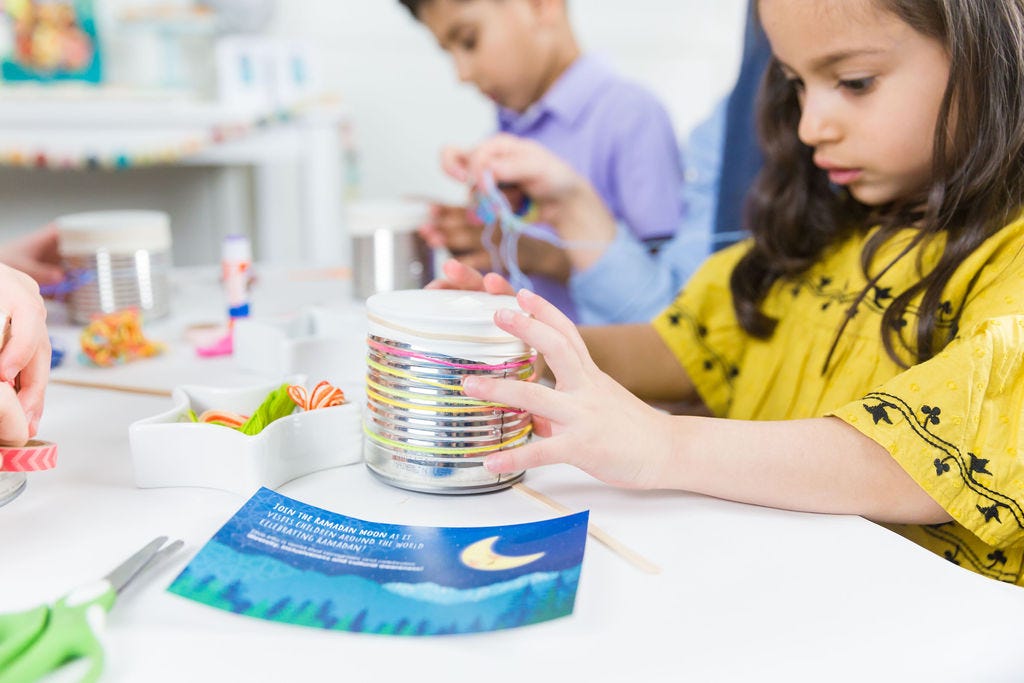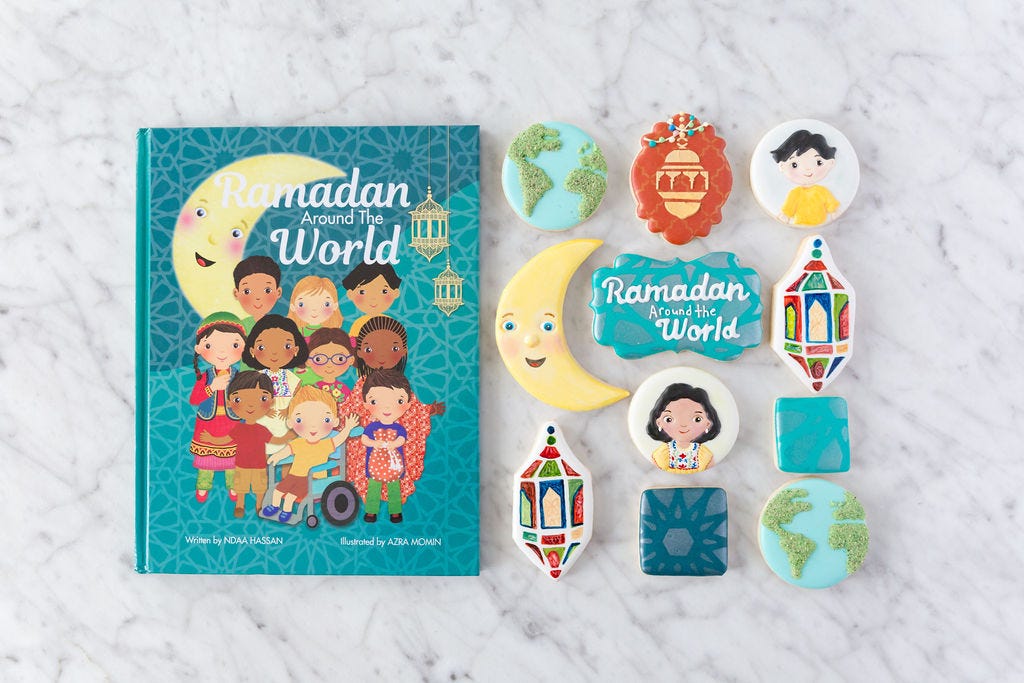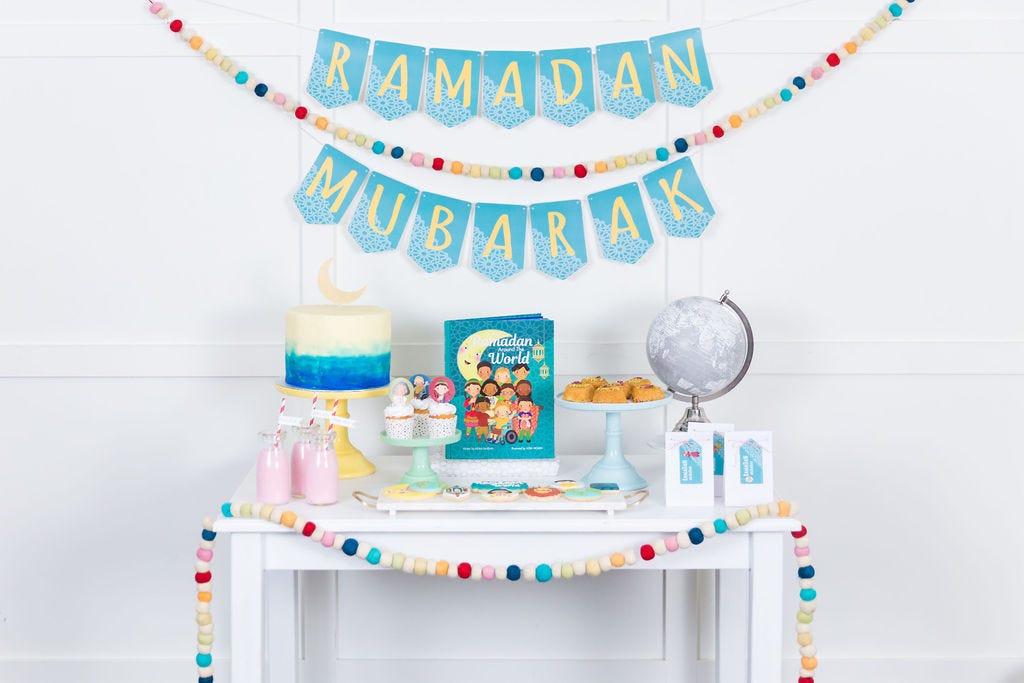Your Complete Guide To Setting Up A Ramadan Storytime
Your Ultimate Guide to Setting Up a Ramadan Event

The holy month of Ramadan is right around the corner and if you are a local public/school library or teacher/educator, you may be in search of ways to create appropriate content, book displays or story times. Below is a list of information and links to make setting up that much easier without having to worry about mis-represntaiton or wrong information.
Interested in setting up a story-time at your local public library/school?
The greater majory of schools and public libraries are very open to the idea of setting up a Ramadan stoyrtime. Some areas require more work than others; however, if presented with the right facts and data on the importance of this holiday in catering to the needs of a large percentage of your demographics, it can be relatively hassle free to either setup a story-time yourself or arrange for a Muslim author to come in for a story-time.
Some points to keep in mind when making your case:
- Be respectful! Be a representation of what our religion preaches — kindness and respect.
- Be prepared! Be prepared with content and materials to ease the setup process. This includes a list of sample books and information about Ramadan or a list of potential authors the library can reach out to and host.
- Be diligent! Most of these government institutions prepare their materials weeks, if not months, ahead of time. This means, a 2-days heads up for an event will be highly impossible. I recommend approaching your library 2–3 months before Ramadan.
- Be Professional! Make sure you are prompt with your replies, with your communications and with the way you choose to speak about Ramadan. For many, this may be thier first outlet to ever hearing about Islam or Ramadan. You want to leave a light-hearted, professional and heart-warming final impression.
- Be Generous! Make sure to follow up with a thank you gift. It could be something sweet and simple to show your appreciation to the people who helped you. They will remember you for next year’s event!
Sample Email to child’s school:
(acquired and tweaked slightly from muslimmatters.org)
Date
Dear (insert name of staff member or principal):
My name is (insert name). We are the parents of (insert child name), a ________ grader (insert School name) this year. We are excited about this academic year.
This year, a portion of school coincides with the holy month of Ramadan, which will start on (insert date) according to the new moon. Ramadan is the ninth month of the Islamic lunar calendar. Muslims are required to fast during this month. We do not eat or drink between dawn and sunset each day during the month of Ramadan, which lasts 29 or 30 days. The month ends with the celebration of Eid al Fitr.
Although (name of child) is not yet at an age where (he/she) is required to fast, (he/she) looks forward to Ramadan every year. (He/She) may be a bit tired in class as young Muslims will often try to fast a few hours of the day to grow their ability to fast a full day.
We would love to come to school and share our holiday with (insert child name) class. This is a great educational opportunity for the students to learn about Ramadan and about the diversity in our multicultural society .
Do contact us so that we can meet and discuss this presentation. You can reach us at (insert phone number ) or (insert email).
We look forward to hearing from you. Thank you for your time and attention.
Sincerely,
(insert your name)
Sample Email to child’s library:
(acquired and tweaked slightly from modernmuslimhome.com)
Dear (insert name of staff member):
The holy month of Ramadan, the ninth month of the Islamic lunar calendar, is set to take place this year on (insert date). Our family will join the other 1.6 billion Muslims worldwide in observing fast during the daylight hours.
I would like to inquire about the possibility of helping coordinate a Ramadan storytime at the (insert public library name) that would include a series of award-winning Ramadan children’s literature, sing alongs, and hands-on crafts. The Muslim community compromises a large percentage of (insert city name) and I would love to come to (insert library name) and share our holiday. This is a great educational opportunity for children to learn about Ramadan and about the diversity in our multicultural society.
Ramadan is a month of spiritual reflect, self-purification, prayer, charity, and of peace. By abstaining from food and drink during the day, we learn to practice self-discipline by sacrificing our basic human needs and to have empathy for those who are less fortunate.
I look forward to hearing back from you on the possibility of setting this up. I would be more than willing to help arrange the content, execution, and provide a list of highly rated and award-winning book recommendations and popular authors, who we could also potentially host at the library.
With Peace,
(insert name and phone number (optional))
Information about Ramadan!
The holy month of Ramadan is celebrated by Muslims around the world once a year. During Ramadan, Muslims wake up early to eat a pre-dawn meal called Suhoor. They fast all day and break their fast at dusk with a meal called Iftar. Many families gather together and invite friends and neighbors to join them for Iftar. Through fasting, people learn the importance of patience and self-control.
Ramadan takes place at a different time each year in accordance with the the Islamic Lunar calendar based on the moon. Ramadan can fall in the heat of summer or the middle of the winter cold. Young children, the elderly, women who are pregnant or nursing, and those who are sick, need medication or are traveling, are excused from fasting.
Most Muslims begin fasting when they are teenagers. Some may fast for a few hours when they are younger to try and learn what it feels like so that each year, their ability to fast grows.
Ramadan Greetings include:
- Ramadan Mubarak (blessed)!
- Ramadan Kareem (generous)!
- Happy Ramadan!
Ramadan Books

Here is a list of appropriate Ramadan books that can be conveniently found on Amazon:
- Ramadan Around The World by Ndaa Hassan
- It’s Ramadan Curious George by Hena Khan
- Lailah’s Lunchbox: A Ramadan Story by Reem Faruqi
- Ramadan (Celebrate the World) By Hannah Eliot
- Ramadan Joy by Omar Khawaja
- Crescent Moons and Pointed Minarets: A Muslim Book of Shapes by Hena Khan
- Under the Moon By Sylvia Whitman
- My First Ramadan by Karen Katz
- Ramadan Moon by Na’ima B. Robert
- Who Will Help Me Make Iftar? by Asmaa Hussein
Ramadan Storytime
If you are looking to set up a short story time at your local school or public library, here is a simple breakdown that you can use and edit as needed. This storytime outline includes
- Welcome / Introduction
- Opening Song
- Story time behavior expectations
- Storytime
- Flannel/Felt Story
- Sing-a-long
- Puppet time (Ramadan drummer)
- Closing Song
- Craft
Ramadan Around The World Event

For a Ramadan event at your local school, a great way to introduce this topic is through the use of the book Ramadan Around The World that explores how various cultures around the world celebrate the Islamic holiday. This event is a great way to celebrate diversity and inclusiveness as children visit each country table/booth to learn more about traditions, explore the culture, taste the food, and grow to appreciate and love one another. Each spread in the book showcases a practical dish or craft that can be displayed/made at each table representative of the appropriate country.
Ramadan Decorations:
Some of the symbols significant to Ramadan include lanterns, stars, and crescent moons. To keep it simple and cost effective for teachers, you can have your student help you cut out some of these shapes and hang onto garlands with some added fairy twinkle lights. That should do the trick :)
Click Here For Free Downloadable Printables
Key Words:
- Adhaan is the call to prayer that beckons Muslims to pray five times a day to remember God and express gratitude.
- Eid ul-Fitr is the Muslim festival marking the end of the fast of Ramadan.
- Fawanees means lamp or light and is most often associated with the Ramadan lanterns.
- Iftar is the meal eaten by Muslims after sunset during Ramadan.
- Masjid is a Muslim house of worship. They are sometimes called mosques but masjid is the preferred word.
- Qur’an “The Recitation” is the central sacred text of Islam revealed to the Prophet Muhammad (peace and blessings of God be upon him) by the Angel Gabriel.
- Ramadan is the ninth month of the Islamic year, during which fasting is observed by practicing Muslims from sunrise to sunset all over the world.
- Sadaqah, meaning ‘charity’, is the concept of voluntary giving in Islam. It is described in the Holy Qur’an as ‘a beautiful loan.’ It encompasses any act of charitable giving done out of compassion, love, friendship or generosity. It can be given to anyone and it has no limits or guidelines.
- Salaam means “Peace be with you” in Arabic and is the greeting used by Muslims around the world to say Hello and Good-bye.
- Suhoor is the pre-dawn meal consumed by Muslims early in the morning before fasting.
- Taraweeh refers to special prayers performed by Muslims at night only in Ramadan.